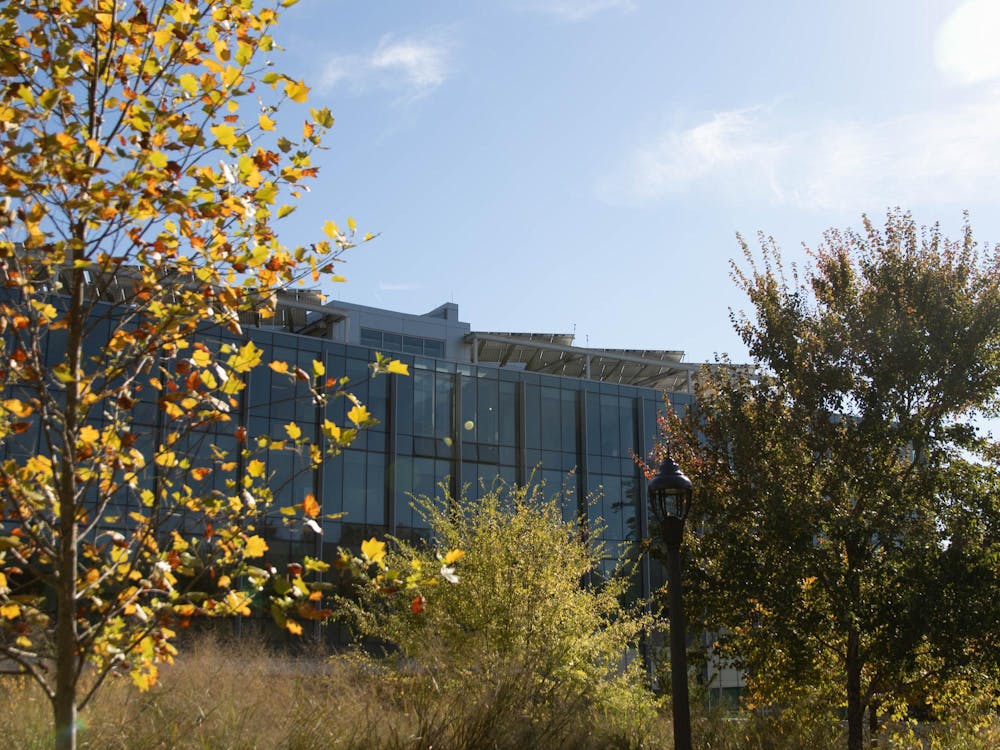The Office of Climate and Sustainability hosted the seventh installment of its Investing for Mission-Driven Institutions seminar series, which focused on the logistics of managing university investment portfolios and issues of investment transparency Tuesday evening in the Bolton Family Tower Room of the Brodhead Center.
The conversation featured insights from Jeff Mindlin, chief investment officer at Arizona State University Enterprise Partners, and Robert McGrail, head of legal and compliance at the Duke University Management Company (DUMAC).
DUMAC is the organization that controls the investment of the University’s endowment, which measured $27.2 billion in 2023. DUMAC also manages Duke’s pension plan assets, the Duke University Health System, much of the University’s working capital and The Duke Endowment.
DUMAC operates by coordinating with outside investment managers who handle smaller portfolios containing portions of the University’s endowment.
“We’ve got a stack of close to 50 people — over 50 people who manage $20 billion … all across the globe in every asset class you can think of,” McGrail said. “If we were to do it directly, it would multiply the complexity a hundredfold.”
McGrail pointed out that outsourcing portfolio management is typical for institutions with endowments of such a large scale and that DUMAC likely handles more assets directly than fund management companies for peer institutions.
The bulk of DUMAC’s work consists of selecting portfolio managers who meet a range of criteria relating to responsible investment practices.
While the organization’s main priority is to generate returns for the University as its primary fiduciary, Duke’s role as a mission-driven institution also requires that DUMAC consider a number of non-financial factors relating to University values. These value-driven concerns are encapsulated primarily in Environment, Social and Governance standards, which McGrail said DUMAC prioritizes in its screening of potential asset managers.
DUMAC’s work to uphold the University’s stance on the climate crisis has been the subject of contentious debate in recent years, with student group Duke Climate Coalition engaging in a 12-year campaign calling on the fiduciary to divest Duke’s endowment from fossil fuel companies.
Student concerns about the endowment’s management are funneled through the Advisory Committee on Investment Responsibility, not DUMAC. ACIR released a report Feb. 16 that recommended DUMAC not divest, claiming that current research does not provide “compelling evidence” that divestment would be successful in reducing carbon emissions.
Mindlin shared his organization’s strategies for managing ASU’s $1.5 billion endowment, which has slightly different requirements as a public university with additional stakeholders.
“We try to go about it from a way of not politicizing the endowment,” Mindlin said. “The university’s charter talks about measuring success not by who we exclude but who we include.”
ASU Enterprise Partners has not divested from fossil fuels but instead employs a number of strategies to ensure they are investing responsibly, including holding securities directly, profiling shareholder resolutions and directly communicating with companies about their business practices.
The fiduciary also uses carbon neutrality goals to inform its investment decisions. Mindlin shared that ASU achieved net-zero scope one and two carbon emissions in 2019, which includes direct emissions and those from the purchase and use of electricity, steam, heating and cooling.
ASU set a goal for carbon neutrality across scope one, two and three emissions for 2035, which would expand accountability to include carbon emissions up and down the value chain of the university’s assets — including its endowment.
Tim Profeta, senior fellow at the Nicholas Institute for Energy, Environment & Sustainability who moderated the conversation alongside DCC co-president and senior Brennan McDonald, spoke to the unique opportunity Duke has to contribute to this innovation as a Tier 1 Research University.
“I will volunteer to come over and figure out what this university research network can do to help you navigate all that,” he said to McGrail in regard to pursuing more robust data analysis of the endowment’s carbon footprint. “I think that would be a good partnership.”
Mindlin also emphasized the role that universities and similar mission-driven institutions can play in pioneering responsible investment practices.
“Our president likes to say that higher [education] makes up less than 5% of the carbon footprint, but we make up 100% of the learning imprint,” he said. “As far as those [research] activities go, they are very resource-intensive, but they’re providing tools for students that are going to go on and try to change the world.”
Get The Chronicle straight to your inbox
Signup for our weekly newsletter. Cancel at any time.

Zoe Kolenovsky is a Trinity junior and news editor of The Chronicle's 120th volume.

